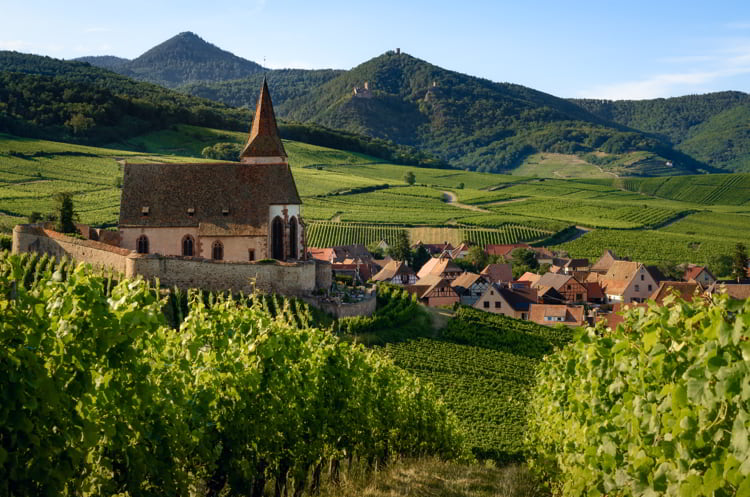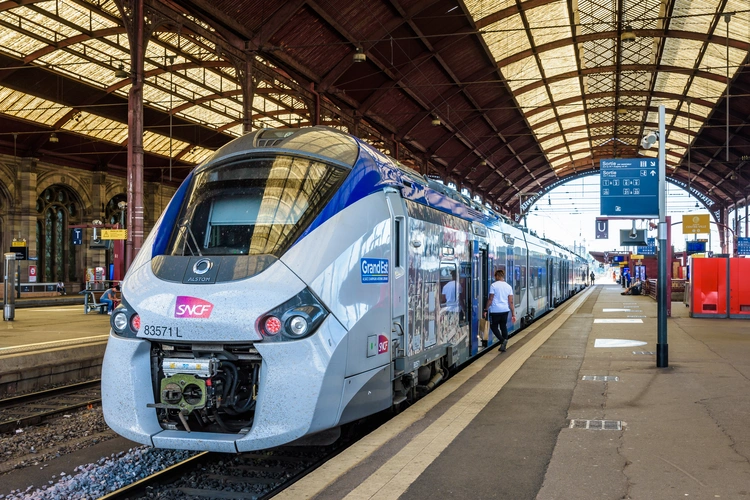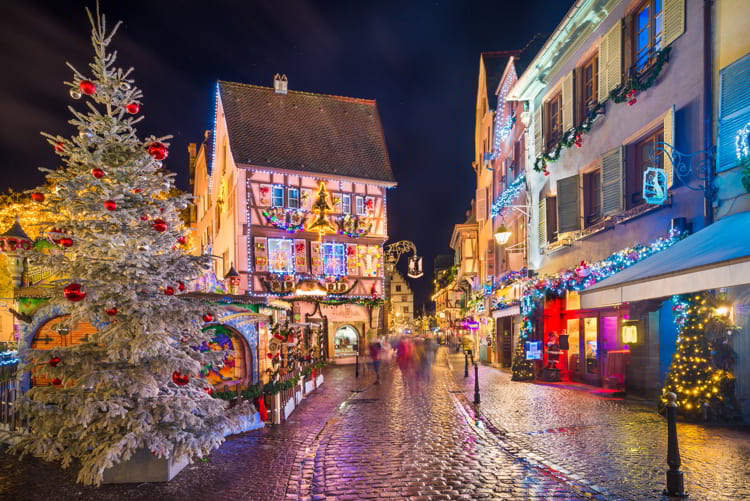Get Your Free Overseas Information Report Today!
Learn more about FRANCE and other countries in our free, daily Overseas Opportunity Letter. Simply enter your email address below and we’ll send you our FREE REPORT - The 10 Best Places To Retire In
Learn more about FRANCE and other countries in our free, daily Overseas Opportunity Letter. Simply enter your email address below and we’ll send you our FREE REPORT - The 10 Best Places To Retire In

Kathleen is the Live and Invest Overseas Founding Publisher. She has more than 30 years of hands-on experience traveling, living, and buying property around the world.

Alsace is in France’s northeast and many expats call it home. Also, it borders with Germany and Switzerland.
The folks who live in Alsace get to experience a unique blend of the culture from all three countries, in particular French and German.
France is the perfect place for retirees. It offers the best quality of life in Europe.
Moving here takes an adjustment to a much slower pace of life.
French people enjoy spending time with loved ones, having engaging conversations over coffee or wine, at any time of day.
Alsace has a fascinating history. The region was part of the Holy Roman Empire and the German realm of culture.
Since the 17th century, Alsace has passed between German and French control numerous times, resulting in a cultural blend.
Therefore, you’ll see the German traits in the more traditional, rural parts of the culture, such as the food and architecture.
On the other hand, French culture dominates the modern institutions.
Alsace is well known for its wine as it’s a major wine-producing region. It’s particularly known for its Rieslings—a dry, white wine. It’s also a well-known beer producing region.
All around Alsace, France, you’ll explore its rich cultural heritage and stunning architecture.
Life in Alsace means enjoying a high number of picturesque villages, churches, and castles.
The main cities and towns in Alsace are Strasbourg (the region’s capital), Colmar, Mulhouse, Haguenau, Sélestat, Guebwiller, Saverne, Obernai, and Thann.
Alsace has a large international expat community. However, expats advise you join a club that specializes in an activity of interest to you. That’s the best way to meet like-minded people.
For example, join a book, film or sports club or take a French language class.
Another great way to meet people are at social events like art exhibitions or music and theatre shows.
For those looking to retire in Alsace, there are also lots of museums and sports facilities dotted around the region. And, if you like the great outdoors and nature, you’ll enjoy living here. Especially if you have a passion for kayaking, biking, and hiking.
There are great hiking opportunities in the Vosges Mountains with interesting wildlife and plants and stunning highland landscapes.
More adventurous expats head for Kaysersberg Valley—where an abundance of activities are available: Walk around Lac Blanc Lake, explore a treetop adventure park, or go biking.
When planning to move overseas, we always recommend to meet with an attorney who specializes in helping foreigners become full-time residents.
They will walk you through your (sometimes many) options and help you choose the one that best matches your circumstances, priorities, and objectives.
Plus, when you plan to reinvent yourlife in a foreign country, it becomes fuller and richer in ways you likely couldn’t predict.
Start Your New Life Today, Overseas

The cost of living in Alsace is moderately expensive.
In the chart below we include the monthly prices for a couple living well in Strasbourg, the region’s capital.
Also, you could live on less if you’re willing to make some sacrifices or decide to live in a smaller town or village.
Let’s take a closer look at the cost of living in Alsace, France.
| Expense | Monthly Costs | Notes |
|---|---|---|
| TOTAL | US$2,404 | |
| Rent | US$976 | Two-bedroom apartment in the city center. |
| Transportation | US$110 | Monthly pass for a couple. |
| Utilities | US$300 | Electricity, including heating and cooling, and water. Internet and Cable TV. |
| Cell Phone | US$68 | Monthly plan with calls and 10GB+ data. |
| Entertainment | US$400 | Eating out twice a week at a local restaurant. Beers twice a week at a local pub. Movie theatre trip twice a month. |
| Groceries | US$450 | Monthly grocery haul. |
| Household Help | US$100 | Twice per week. |
Start Your New Life Today, Overseas

There is so much to explore in Alsace. Below are just some of the highlights.
Take a walk through the Grande Île in the heart of Strasbourg’s city center. The architecture is stunning—not surprising that it features on the UNESCO World Heritage List.
Check out the Place du Château Square, where you’ll see the royal Palais Rohan, home to three museums.
Next to that is the Strasbourg Cathedral. Climb the 332 steps to its platform to take in the breathtaking views of the city.
The wine-producing town of Obernai is a few miles from Strasbourg.
Stop at one of the terrace restaurants at Place du Marché Square, and enjoy local cuisine while taking in the town’s impressive medieval architecture of the City Hall and the Watchtower.
In picturesque Sélestat, with its half-timber houses, check out the Humanist Library—a treasure of the Renaissance that houses a large collection of medieval manuscripts.
Follow the scenic Alsace Wine Route for a tour of the vineyards and the quaint villages in the region. There are seven Alsatian grape varieties on this route.
In the city of Colmar, start your visit in Little Venice—a labyrinth of canals that you can explore by boat.
Also worth seeing is the Old Town’s Gothic and Renaissance gems, in particular Saint Martin’s Collegiate Church.
Start Your New Life Today, Overseas

Alsace, France, is a very safe region to live.
Petty theft happens everywhere. So, be cautious when you’re outside and carrying valuable items. Use your common sense.
Health care in France is arguably the best in the world. It is among the many reasons Americans choose to move to France.
For years, the World Health Organization (WHO) published an index rating and ranking the quality of health care in every country in the world. Year after year France came out on top.
And, beiing a member of French Social Security (that is, you’re paying into the system), most of the cost of this extraordinary health care is covered.
Generally, though, non-EU residents will not be able to access the public health care system and will need to seek private care.
The Ministry of Health coordinates all matters related to health care in France. It works well because it is a fully integrated system meaning that public and private hospitals, as well as doctors and other medical professionals, recognize and accept the plan.
The French government asks for proof of insurance when applying for a long-stay visa—and keep this insurance for the first five years of living in France.
After this, you can apply to take part in the public system. To qualify, you’ll need to be working in France, self-employed and making the necessary contributions, or of retirement age.
Health care in Alsace includes excellent hospitals, such as the Hôpital civil de Strasbourg, one of France’s oldest medical institutions. Wherever you choose to live, you’ll have a choice of both private and public hospitals. There are also plenty of clinics, dental surgeries, and pharmacies.
Prescriptions are also usually significantly cheaper in France, but make sure to look up where to go because pharmacy stocks are different than in the US.
Start Your New Life Today, Overseas
U.S. and Canadian citizens are automatically granted a 90-day tourist visa when entering the country for business or personal travel.
This is referred to as a “short-stay” visa (type C). Officially it’s called aVisa de court séjour Schengen,a short-stay Schengen visa, as it allows you 90 days within the Schengen Zone at large, not just France.
To apply for a long-stay visa (type D), make an appointment at the French consulate nearest you in your home country—generally you are required to submit the application in person, but some accept applications via mail. You can request stays of four months up to a year.
The approval process can take anywhere from a couple weeks to several months.
This visa allows for a stay of four to six months and you do not need to apply for a residency permit once you’re in France under this visa.
This visa allows you to enter and stay in the country for four months to a year, but you’ll need to register with the French Office of Immigration and Integration (OFII) to validate it within three months of arrival.
To do this you’ll have to fill out a form that was provided to you by the consulate before leaving home and mail it to the OFII office nearest you (find the office nearest you on their website) along with copies of passport ID pages as well as any pages used to enter the country.
Once received, your application will be registered. After that, you’ll be given an appointment date for a medical checkup and be interviewed by OFII.
At this appointment you must bring your passport, proof of domicile, a photo ID, tax stamps, and the medical certificate if done in advance. For visa renewals, you must apply for an extension with local authorities (préfecture) in the two months preceding expiry.
This visa allows you to enter France and request a residency permit at thepréfecturewithin two months of arriving. You can request a stay of a year, multiple years, or 10 years once you’re in country. These are typically granted to retirees, relations of French people, professionals (or independently employed), contractual workers, and artists.
Regardless of which option you go for, when you apply at the consulate.
You’ll need the following documents:
· Passport valid for a minimum period of three months beyond the last day of stay intended in France, i.e., a year and three months minimum for a stay of one year. Make four copies of the identification page and attach them.
· Long-stay application form clearly filled out in black and signed.
· Two photographs: They must be recent, identical, passport-size, on a white background, with the face taking up 70% to 80% of the photograph.
· An OFII form (only available in French) that you will have filled in all the upper part (above the middle section). If your visa is granted, the consulate will stamp this form and give it back to you. You will then fill in the last portion of it upon your arrival in France and send it to the closest local branch of the OFII of your home in France.
· At the minimum, a bank statement of all bank accounts (checking, savings, CDs, etc.) that you own or co-own, with detailed transactions for the past three months and the daily balance.
· Documentation about any funding or assets you have, for example proof of retirement or pensions, or a notarized declaration of your sponsor stating that you will be responsible for all your expenses, together with a proof of your complete assets.
· Written statement, dated and signed by the applicant, saying that you do not intend to have a paid professional activity which requires a work permit.
· Proof of medical insurance with full coverage, valid in France. The insurance should state that under your policy you are covered for medical expenses, emergencies, and hospitalization for a long stay in France, together with the limit amount of coverage, if there is one.
· Notarized deed of your house/apartment or rent contract for the stay in France (for a whole year if a minimum stay of one year is intended), with the address of the rented place, tenant contact information, and the monthly rent amount. If the deed in France has been acquired more than a year prior to your application, you will be required to provide your local French tax return (Taxe Foncière).
· Processing fee, paid in cash, by credit card, money-order, or certified checks. Above all, personal checks are not accepted.
While these general documents will likely be required by all, it’s possible your personal situation will require additional documents.
France immigration recommends always getting in touch with your consulate before applying to verify the list of documents you should provide.
Most importantly, all documents must be translated by a certified translator and must be presented in original, together with one copy.
After living in France for five years on a Long-Stay Residency Card, you can apply for a Permanent Residency Card.
France has two types of Residency Cards, known locally as a carte de séjour orcarte de résident.
Most foreigners will be given acarte de séjour. The Permanent Residency Card is valid for 10 years and is automatically renewable.
To apply for a visa, use the term “Consulate General of France” to do an online search.
Each Consulate manages a region. So, you will need to determine which office is responsible for your state.
Alsace has a temperate climate with warm summers and cold winters.
July is the warmest month with an average temperature of 79°F.
The coldest month in Alsace is January, where temperatures hover around 43°F.
Most importantly, Alsace experiences significant rainfall throughout the year.
French is widely spoken throughout the region. And, in some areas, German is also spoken.
Schools teach English. However, if you’re moving to Alsace take some French classes and learn the basics of French. This will make expat life much easier.
As a result, navigating all aspects of your new life in Alsace—from renting an apartment to ordering food in a restaurant will be more enjoyable.
The euro is France’s currency. Throughout the Alsace region you’ll find lots of ATMs if you need to withdraw cash. Most importantly, credit cards are widely accepted.
Learn more about FRANCE and other countries in our free, daily Overseas Opportunity Letter. Simply enter your email address below and we’ll send you our FREE REPORT - The 10 Best Places To Retire In

© 2008 - 2024 Live and Invest Overseas - All Rights Reserved.
Sign up for FREE and learn how to live the good life on a modest budget, find bargain property, and more. Plus, check out our free report on the 10 BEST PLACES TO RETIRE.
RETIRE OVERSEAS AND LIVE LIKE ROYALTY
Sign up to receive the FREE daily e-letter, Overseas Opportunity Letter and we’ll immediately email you our editors’ latest research report…
RETIRE OVERSEAS AND LIVE LIKE ROYALTY
© 2008 - 2024 Live and Invest Overseas - All Rights Reserved.